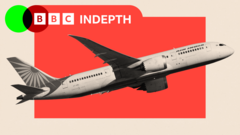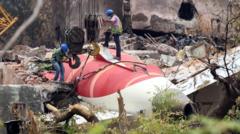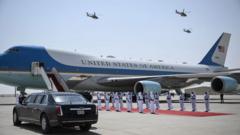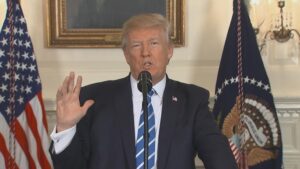The U.S. Department of Commerce's recent investigation into imported planes and related parts raises the prospect of new tariffs, which could significantly impact the aerospace industry, known for its trade surplus advantages.
Investigation Launched into Imported Aircraft Parts Could Prompt New Tariffs

Investigation Launched into Imported Aircraft Parts Could Prompt New Tariffs
The Trump administration's investigation may usher in tariffs aimed at protecting the aerospace sector.
The Trump administration has initiated an investigation concerning the importation of commercial aircraft, jet engines, and adjunct parts that might lead to the implementation of additional tariffs on these products, as per an official notice released online Friday. This investigation, initiated on May 1 by Commerce Secretary Howard Lutnick, was conducted under the Trade Expansion Act. This act empowers the president to impose tariffs on foreign products deemed unfit for national security.
Previously, President Trump has exercised this power to levy tariffs on aluminum and steel and has launched similar probes into semiconductors and pharmaceuticals. The new investigation aims to gather industry insights regarding the domestic demand for aircraft and components, the contribution of foreign suppliers, and whether foreign governmental support favors any specific businesses.
Experts warn that imposing tariffs could adversely affect the aerospace sector, renowned for maintaining significant trade surpluses over the years. The industry heavily relies on a global supply network for specialized components, with some parts being sourced from a limited number of manufacturers. According to market research firm IBISWorld, the aerospace sector anticipates approximately $125 billion in exports for the year, positioning it as the second-largest export industry, following oil and gas.
Eric Fanning, the president of the Aerospace Industries Association, highlighted the sector’s accomplishments by stating, “Our record of trade surpluses, job creation and innovative contributions to both air transport and national defense is the best news story for the American economy.” He expressed optimism about engaging with the Department of Commerce to strengthen the domestic supply chain while preserving the advantageous global trade structures.
Boeing, a leading manufacturer of commercial airplanes, indicated that while the direct impact of tariffs implemented thus far has been comparatively minor, they remain concerned about the potential repercussions on their suppliers. CEO Kelly Ortberg noted that the company endures a 10 percent tariff on components supplied from Japan and Italy for wide-body jets but expects to recoup such costs upon selling the planes.
In contrast, RTX, a manufacturer of engine components, projected a tariff-related expense of approximately $850 million, while GE Aerospace anticipated costs of around $500 million for the year.
Historically, governments have sought to protect their aviation sectors through a combination of tariffs and subsidies. The longstanding dispute between the U.S. and European Union over alleged unfair subsidies to Boeing and Airbus has been a notable example of such competition. This protracted conflict ended in 2021 when both entities decided to collaborate on countering China’s growing presence in vital industrial sectors.
Niraj Chokshi is a correspondent focusing on aviation, rail, and various transportation industries.























